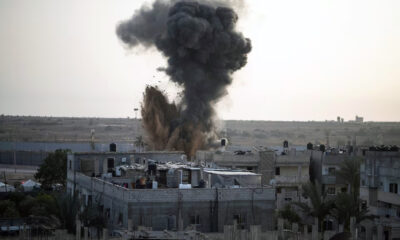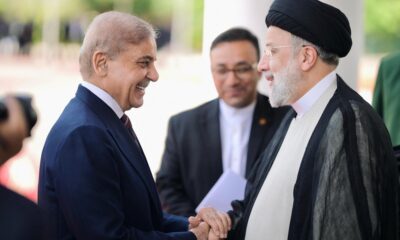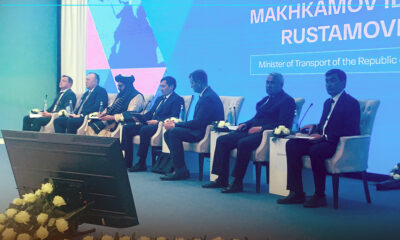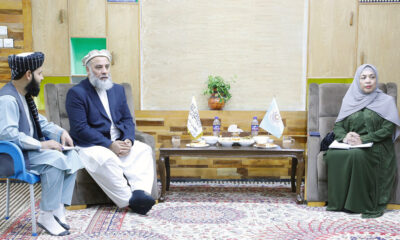Latest News
Media watchdog reports a sharp increase in violence against journalists

The Afghan Journalists Safety Committee said Thursday that it recorded 132 threats and violence against journalists in 2020 – a 26 percent increase compared to 2019.
This includes the death of seven journalists and media workers. Five were killed as a result of targeted killings and two with IEDs.
The AJSC said in its annual report, released Thursday, that this reports the worrying state of journalists safety and press freedom in the country.
“The rise in violence particularly the targeted killing of journalists has generated extensive fear among media workers, reduced media outlets’ content production capabilities, and expanded self-censorship,” the committee said.
The organizations stated that Afghanistan has reached a historically critical juncture and that although recent rounds of peace negotiations have caused some hopes that an end to the four-decade conflict may be in sight, the surge in violence – especially the targeted killing of journalists and civil society activists – has cast serious concerns over whether peace talks will succeed and whether core values enshrined in the constitution on freedom of expression and civil liberties will be protected if peace talks lead to a political settlement.
“The dramatically increased levels of direct attacks and assassinations of journalists at the end of 2020 has created widespread panic among media outlets and journalists across Afghanistan.
“These attacks have had a noticeably adverse effect on impartial and objective reporting, with many journalists admitting to reconsidering both how and whether to report on certain topics for fear of reprisal – effectively amounting to the increasingly widespread practice of self-censorship,” the AJSC said in a statement.
In addition, the economic impact of Covid-19 has compounded existing financial challenges for media outlets, often frustrating their efforts to raise sufficient funds, and thereby their capacity to generate media content.
The AJSC said media and civil society groups remain concerned that the delegation representing the Afghan Republic in negotiations with the Taliban in Doha, Qatar lacks a coherent strategy to preserve key constitutional rights including freedom of speech and a free and independent media.
“The Taliban’s ideological opposition to these values enhances concerns about the future of such freedoms. Further, the government’s efforts in early 2020 to draft a new Media Law, which could extensively limit press freedom if enacted, and the lack of meaningful commitment to investigate the cases of murdered journalists have fueled these concerns,” the statement read.
The report states that in 2020, AJSC recorded threats and violence against 132 journalists and media workers, which includes killing of journalists, injuring them, physical assault, kidnapping, various forms of threats, theft, verbal, legal and administrative abuse.
“2020 data shows 26 percent increase in violence and threats compared to 2019 in which AJSC recorded violence and threats against 105 journalists and media workers,” the statement read.
In addition to the seven journalists and media workers killed, 18 journalists and media workers were injured whilst reporting and on duty.
Another 10 journalists were physically assaulted, 47 threatened, 28 verbally abused and 13 journalists and media workers faced legal and administrative abuse by media managers.
Seven journalists were kidnapped and two experienced theft while gathering content from the field.
The AJSC said that based on data collected, Taliban and Daesh account for the majority of violence and threats against journalists. Government officials come second.
Latest News
Mullah Baradar discusses creation of railway with Kazakh deputy PM

Mullah Abdul Ghani Baradar, deputy prime minister for economic affairs has met with Erik Zhumangarin, the Deputy Prime Minister of Kazakhstan, and discussed the establishment of a railway network from Kazakhstan to Pakistan through Turkmenistan and Afghanistan, the deputy PM’s office said in a statement.
During the meeting, Baradar emphasized the need to sign agreements to solve the banking problems of traders from both countries, the creation of Afghan-Kazakh joint companies, and the facilitation of visas for Afghan traders.
According to the statement, the Deputy Prime Minister of Kazakhstan said that the Kazakh government intends to establish a joint chamber of industry and commerce and a joint trade and labor group between the two countries, and is ready to cooperate with Afghanistan in the sectors of e-governance, industry, higher education, education, health, and banking.
Latest News
Iran, Pakistan leaders raise concerns over ‘terrorist groups’ in Afghanistan

Following a two-day official visit to Pakistan, Iranian President Ebrahim Raisi and Pakistan’s Prime Minister Shehbaz Sharif issued a joint statement emphasizing the need to further expand commercial and economic cooperation and transform the common border of the two countries from a “border of peace” to “border of prosperity”.
The two leaders also strongly condemned aggressions and crimes of Israel in Gaza, and demanded an immediate and unconditional ceasefire, as well as unimpeded humanitarian access to the besieged people of Gaza.
Numerous other issues were also discussed but on the topic of Afghanistan, they jointly declared their commitment to the development of Afghanistan as a peaceful, united, independent country free from the threats of terrorism and drug trafficking.
According to the statement the two countries pointed out that the existence of terrorist organizations in Afghanistan is a serious threat to the security of the region and the world.
The two sides stressed their desire to strengthen cooperation in the field of fighting terrorism and ensuring security and creating a united front against terrorism.
They also discussed the importance of coordinating regional and international efforts to ensure security and stability in the region.
“While respecting the sovereignty and territorial integrity of Afghanistan, the two sides recognized that increasing participation of all strata of Afghans in basic decision-making will lead to the strengthening of peace and stability in this country,” the statement read.
Latest News
Over 1,000 Afghan refugees forced out of Pakistan in one day

The Ministry of Refugees and Repatriations (MoRR) says over 1,000 Afghan migrants were forcibly returned from Pakistan on Tuesday through Spin Boldak border crossing in Kandahar province, the ministry said in a statement.
The ministry stated that based on information provided by the Spin Boldak Kandahar border command, these returnees comprised 191 families, totalling 998 people.
In addition, three migrants released from Pakistani prisons were also returned, according to the statement.
The statement added that after registering the returnees, the refugees were referred to the offices of the International Organization for Migration (IOM), the World Food Program (WFP) and the United Nations High Commissioner for Refugees (UNHCR).
Each family received 10,000 afghanis – paid to them by the Islamic Emirate.
In another statement, the ministry said that 2,783 migrants living in Iran voluntarily and forcibly returned to the country during this week.
-

 Sport5 days ago
Sport5 days agoAfghanistan Champions League kicks off with grand opening ceremony
-

 Latest News4 days ago
Latest News4 days agoPakistan’s frontiers minister stresses ‘dignified’ return of Afghan refugees
-

 Business5 days ago
Business5 days agoAfghanistan’s economic prospects are bleak: World Bank
-

 Latest News5 days ago
Latest News5 days agoMore than 800 Afghan refugees deported from Pakistan in two days
-

 Regional3 days ago
Regional3 days agoIranian president lands in Pakistan for three-day visit to mend ties
-

 Climate Change4 days ago
Climate Change4 days agoMassive river flooding expected in China, threatening millions
-

 Latest News4 days ago
Latest News4 days agoChinese keen to invest in Panjshir-Kabul water conduit project
-
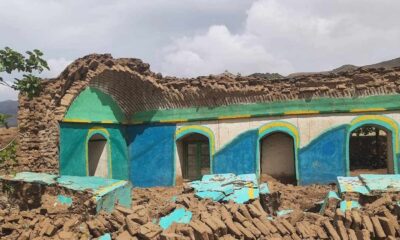
 Latest News5 days ago
Latest News5 days agoRoof collapse kills two in Helmand


